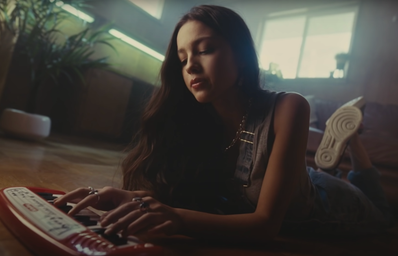First love. Heartbreak. The initial sorrow and the appending rage the comes with your first breakup. Following the release of Olivia Rodrigo’s debut album Sour, people on social media found themselves looking back at the trials and tribulations of their past teenage-hoods, imagining what they may have done with her music to back them up. These fantasies have brought me back to a time in my life that I swore to forget, and now can’t let go of – a time when I was made to feel like the teenage problems were trivial, and when I found myself at the center of society’s criticism of teenage girls.
When I first listened to Rodrigo singing the lyric, “How could I ever love someone else?”, I couldn’t help but feel the urge to give the poor girl a hug. I wanted to let her know that she is so young, and that boys will come and go. Eventually, everything will be okay. I realize now that it’s not Rodrigo whom I wanted to give reassurance to, but rather my 16-year-old self.
I don’t hold many particularly fond memories of high school, and much of that is probably because of how ashamed I am both of the person I was back then and how I handled feeling the ways a teenage girl would naturally feel. I was also nowhere near as talented as Rodrigo, so I couldn’t channel my adolescent angst into beautiful, catchy music with the occasional bite of vulgar language. Instead, I turned to acting like everything was A-OK. I convinced myself that I wanted nothing to do with boys or relationships after getting my feelings hurt by people who, looking back at it now, were definitely not worth my time. I adopted that “not like other girls” mindset and became, admittedly, quite pretentious.
If I had Olivia Rodrigo’s music during this period in my life, I might have let out all of that anger, anguish, frustration, and sadness I had bottled up. I might have actually let myself cry on the shoulder of my best friend. I might have actually approached those who hurt me for closure. I was 16 years old — I was definitely allowed to feel the way I did, and I don’t know why I convinced myself – or allowed others to convince me – otherwise.
Society loves to invalidate the way that teenage girls feel.
In an April 2021 interview with The Face, Rodrigo explained that Sour was conceived out of her desire to explore the “sour” emotions that women and young girls are often shamed for, such as anger, sadness, and jealousy. This is the very reason that I admire Rodrigo and the work she has put out, and the very thing teenage girls need today. There’s a cultural resentment towards teenage girls and everything that they’re interested in that has been embedded in society for a long time. I personally saw this with the amount of criticism aimed towards artists such as Justin Bieber and One Direction. I still see it today, with the hate directed towards TikTok and its predominantly female users.
But to contrast with Rodrigo’s current success, I distinctly recall how much criticism female artists such as Taylor Swift received for creating music about the ups and downs of teenage relationships. This internalized misogyny snowballed into labeling Swift as “boy crazy” and insinuating that she was capitalizing off of her past relationships.
Society loves to invalidate the way that teenage girls feel. Oftentimes, this invalidation can come from criticism from other teenage girls who see themselves as superior because they don’t hold the same interests as the “other girls.” When I was 16, I was undoubtedly like the latter. Five years later, I feel both resentful and indebted to Olivia Rodrigo for making me lament about a time in my life that I, for a long time, refused to ever think about again. Her music stands as a reminder that it’s totally okay for teenage girls to feel the way they do, and I hope that the girls that do have Olivia Rodrigo in high school take what she has to say to heart.


